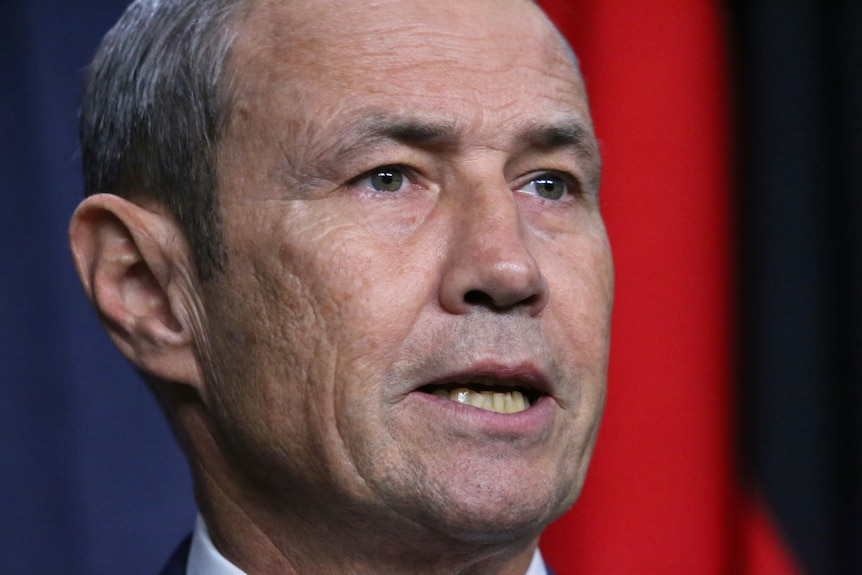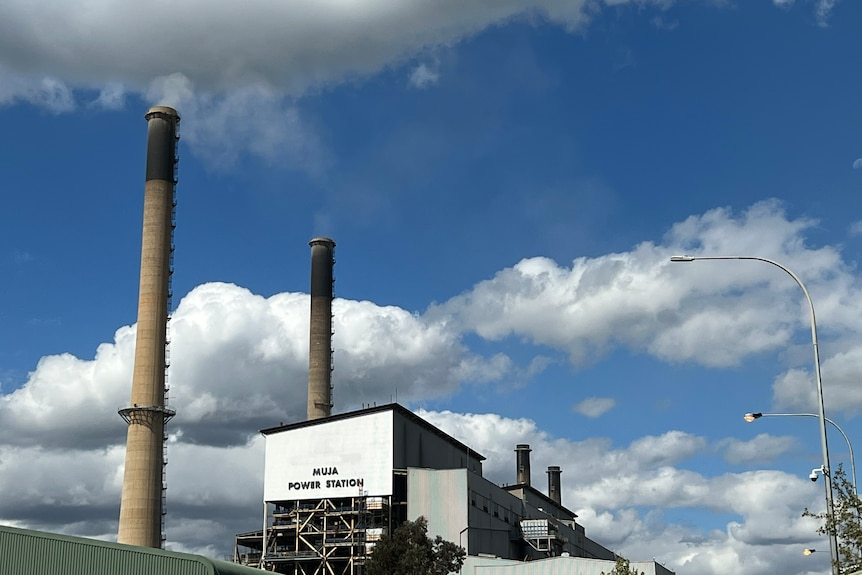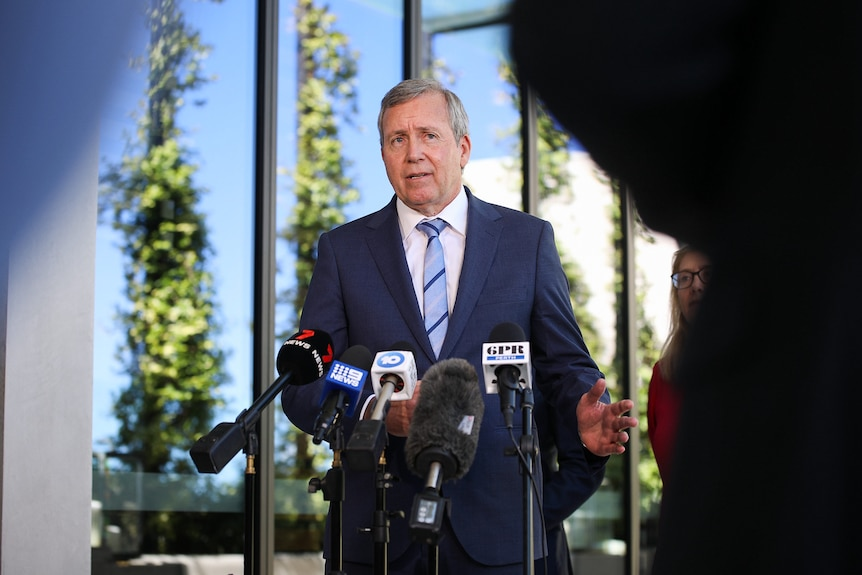
West Australian Premier Roger Cook says his state is on track to achieve net zero emissions by 2050, but 7.30 understands internal modelling is projecting it will not, based on its current trajectory.
The federal government has committed to reduce emissions by 43 per cent by 2030, and all states and territories, bar two, have set their own goals.
· Tasmania: Net zero
· ACT: 65 to 75 per cent
· South Australia: More than 50 per cent
· New South Wales: 50 per cent
· Victoria: 45 to 50 per cent
· Federal: 43 per cent
· Queensland: 30 per cent
Western Australia and the Northern Territory, the only two jurisdictions where emissions are higher now than in 2005, have not set whole-of-economy emissions targets for 2030.
Both WA and the NT have pledged net zero emissions by 2050 and have modelled future emissions scenarios to inform their policies and strategies for getting there.
The NT government is yet to release an emissions forecast report that was first due to be released in 2021 and was then delayed to 2022.
7.30 understands internal modelling before the WA government indicates that the state's emissions are on track to be 2 per cent below 2005 levels in 2030.
The modelling, 7.30 understands, indicates WA's emissions would need to be 11 per cent below 2005 levels in 2030 in order for the state to be on track for its 2050 target.
When 7.30 put the figures to Mr Cook earlier this week, he denied the state was not on track.

Roger Cook says the state will have a "significant uplift" in low emissions industries towards the back end of 2030.( ABC News: James Carmody )
"I think the point to be made is that it won't be a linear progression," he said.
"Our pathway to net zero is unique in Australia.
"We have a significant number of high emitting industries particularly associated with our resources sector.
"We will see a significant uplift in our renewable energy capabilities and therefore a reduction in our emissions towards the back end of 2030, particularly as we see our hydrogen industry take hold.
"We are going to see a significant uplift in our low emissions industries towards the back end of 2030."
Western Australia's net emissions are currently about 4 per cent higher than 2005 levels because of strong growth in mining and exports, which has driven increases in emissions from fossil fuel extraction.
WA's Pilbara region makes up about 40 per cent of the state's overall emissions and is home to one-quarter of the nation's biggest emitters.
Those companies are all covered under the federal government's Safeguard Mechanism, which forces big polluters to either cut their emissions each year or pay for carbon offsets.

The Muja coal-fired power station is WA's biggest, but it's due for closure in 2029.(ABC News: Daniel Mercer)
ANU Professor Frank Jotzo says a more uniform approach to tracking jurisdictional emissions plans would help the nation's decarbonisation efforts.
"It would certainly be useful to have a relatively consistent system of state-based emissions projections, state-based emissions strategies and also goals or targets," he said.
"Coming to a point where all states have a 2030 target would absolutely be desirable, not just from a public accountability point of view but also from an industry and investor point of view.
"Every tonne of emissions not reduced in WA needs to be reduced somewhere else in the country in order to achieve the national emissions target."
Do you know more about this story? Get in touch with Rhiannon Shine at shine.rhiannon@abc.net.au.
The Climate Council's Jennifer Rayner said both WA and the NT should make their internal emissions projections public.
"We need that level of transparency so that we can understand how as a community and as a nation we are going to cut harmful carbon pollution across the nation," she said.
"The WA government is fundamentally leaving it too long by not establishing a 2030 emissions reduction target."
The WA government's Climate Change Bill, which it introduced to parliament in November, will legislate the target of net zero emissions by 2050 and require interim targets to be set.
Reporting under the climate change legislation will start in 2025.
WA's Climate Action Minister Reece Whitby declined an interview with 7.30.
In a statement, he said the government will release emissions projections as part of setting interim targets, which is required under the Climate Change Bill – but not until 2025.

WA Environment Minister Reece Whitby.( ABC News: Keane Bourke )
"The State Government will publish projections undertaken to support the setting of a target and emissions budget for 2035, which is required following setting of a national target for this date," he said.
"This approach to publication of emissions analysis is consistent with the approach of other Australian jurisdictions.
"As a jurisdiction with heavy industries that are hard to abate, WA has a unique path to net-zero emissions.
"However, the WA Government is serious about tackling the threat of climate change and achieving net zero emissions by 2050, as well as playing a role in the global energy transition through gas, renewable hydrogen, and critical minerals.
"WA's decarbonisation will be achieved through legislation, the decision to retire all state-owned coal-fired power plants by 2030, and other measures like our landmark decision to ban native forest logging.
"Projections in all cases are based on the best available information at the time of modelling, as well as assumptions and information that is subject to change."
An NT government spokesman told 7.30 the territory was a small contributor to Australia's greenhouse gas emissions, "representing just 3 per cent of Australia's emissions".
"The NT government has set a number of interim targets for 2030 [including] 50 per cent renewable energy for grid connected electricity consumption [and] a 47 per cent reduction in NT government operational emissions compared to 2021 levels.
"The NT government is developing a plan to achieve net zero by 2050. NT government is considering further interim emissions targets as part of this work."
Watch 7.30, Mondays to Thursdays 7.30pm on ABC iview and ABC TV

